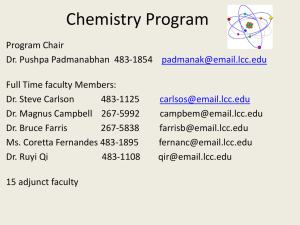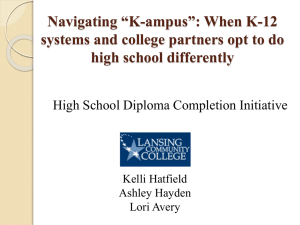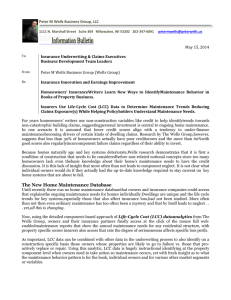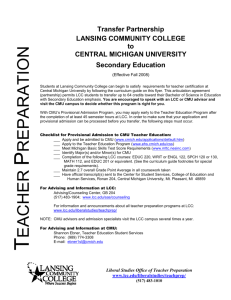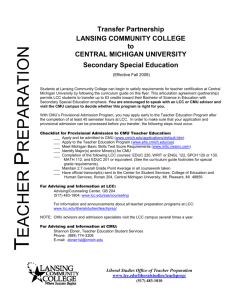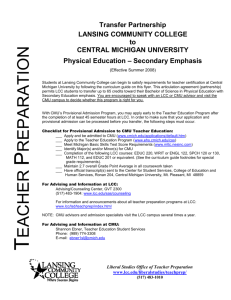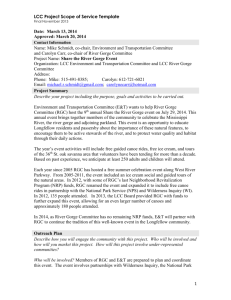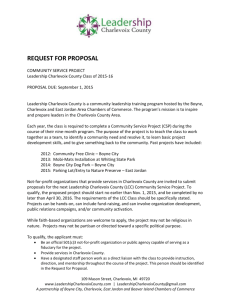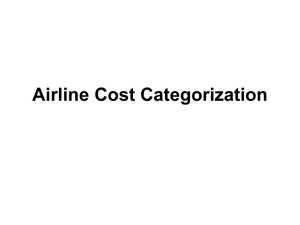(LCC) Workgroup (WG)
advertisement
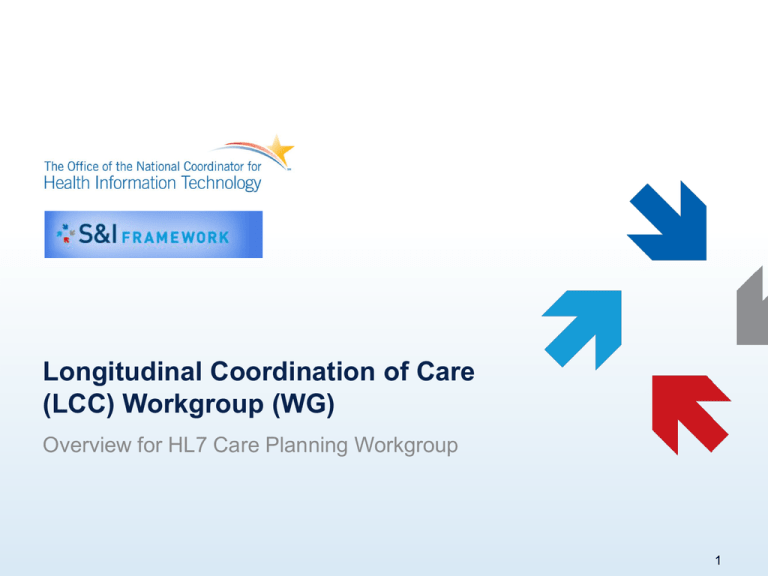
Longitudinal Coordination of Care (LCC) Workgroup (WG) Overview for HL7 Care Planning Workgroup 1 Overview • • • • • • • LCC WG & Sub-Workgroups Key Accomplishments of the LCC WG Key Recommendations from LCC Whitepaper Care Planning Process and Care Plan Model LCC WG Proposal to Advance Standards Interoperable Collaborative Care Plan Attributes Other LCC SWG Accomplishments: – LTPAC data elements & transitions – PAS crosswalks – C-CDA Implementation Guide 2 LCC Sub Workgroups (SWG) Longitudinal Coordination of Care Workgroup Longitudinal Care Plan SWG G O A L S • Identify standards for an interoperable, longitudinal care plan which aligns, supports and informs personcentric care delivery regardless of setting or service provider • Providing subject matter expertise and coordination of SWGs • Developing systems view to identify interoperability gaps and prioritize activities Patient Assessment Summary SWG LTPAC Care Transition SWG • Define data elements for longterm and post-acute care (LTPAC) information exchange using a single standard for LTPAC transfer summaries • Establish the standards for the exchange of patient assessment summary documents *Care Plan will enable providers to create, transmit and incorporate goals, objectives, and outcomes for the benefit of medically complex and/or functionally impaired individuals, their families and caregivers. 3 Key Accomplishments 1. LCC Use Case. Outlines three scenarios for health information exchanges between: 1) an acute care hospital and home health agency (HHA); 2) a skilled nursing facility (SNF) and the Emergency Department (ED); and 3) a Physician and a HHA – Two of the scenarios center on the Home Health Plan of Care (HH-POC), based off CMS 485 form. The HH-POC supports the HHA in providing patient service via MD orders. The HHA and physician exchange information on patient’s evolving condition and needs, and the services the HHA will perform. 2. LCC Whitepaper. Meaningful Use Requirements For: Transitions of Care & Care Plans For Medically Complex and/or Functionally Impaired Persons. Includes a robust discussion of needs and issues regarding interoperable care plan collaboration and exchange. – A summary is also available here. 3. Preliminary Stage 3 MU Recommendations. Provided for July 16, 2012 meeting of Health IT Policy Committee Meaningful Use Subworkgroup #3 (includes comments on proposed Meaningful Use Stage 2 requirements related to care plans) 4 Key Recommendations from LCC WP 1. Incorporate requirements for the use of interoperable clinical content, standards, implementation guides in the Stage 3 MU Program 2. Advance Standards, Implementation Guides, and EHR Certification Criteria to support the ‘care coordination’ recommendations for the Stage 3 MU Program 3. Identify requirements for the interoperable exchange of Collaborative Care Plans for the Stage 3 MU Program 4. Provide ONC/OSI Support and Resources to advance the recommendations outlined 5 Care Planning Process Definition, content, sections, and standards of a collaborative care plan that can support care planning for a variety of patient types over time – interoperably. An animated Powerpoint presentation of this LCC vision of longitudinal care planning is available on the wiki here. 6 Collaborative Care Plan Model Care plan inputs and process as described in LCC White Paper (see page 18). Proposal to Advance Care Plan Standards • Investigate, select, adapt, or develop one or more providermanaged and patient-managed models • Establish a framework for communication from and to the person, his/her designated care team that is keyed to the person’s care plan • Identify applicable health IT exchange standards • Promote a unified semantic payload framework (e.g. terminology) and methodology of use that can support care plan, care management interventions, and exchange • Employ syntactic approaches that include but are not necessarily limited to C-CDAr2/RIM v3 approaches to enable participation by LTPAC providers, respecting their concurrent technology capacities * Note: This is a proposed approach WG members have identified to meet LCP SWG goals and recommendations from the LCC Whitepaper. 8 Attributes of a Certifiable Interoperable Collaborative Care Plan Promote: • Person-specific content development and updating that reflects the health needs, personal values, resolve, and bioregenerative capacity of the medically complex and/or functionally impaired person it serves • Patient-consented care team, care plan and care planningrelated information transfer that maximizes team member effectiveness and is bi- and/or multi-directional, as needed • Best practices in care plan development, updating, and maintenance in keeping with applicable cohorts • Dignity and self-actualization in every life stage for appropriate, individualized, coordinated care 9 Other LCC SWG Accomplishments Long Term and Post-Acute Care (LTPAC) Transitions of Care SWG: • Priority Transitions. Examined transitions to/from eleven providers • IMPACT Project Data Elements List. Updated and merged LCC Use Case 1.0 Data Elements – Five transitions of care data sets, all subsets of the LCC Use Case Data Elements. The permanent transfer of care contains the entire set of data elements. Patient Assessment Summary (PAS) SWG: • Balloted Functional Status, Cognitive Status, & Pressure Ulcer templates for Consolidated CDA (May 2012) • Balloted Patient Questionnaire Assessment Summary Implementation Guide for CDA Release 2 (September 2012) • Mapped the MDS, OASIS, CARE Tool, Massachusetts Universal Transfer Form (IMPACT Dataset #5 with 328 data elements), and C83 data elements (prioritized by Beacon Community Affinity Group). (link) 10
